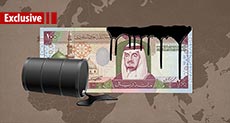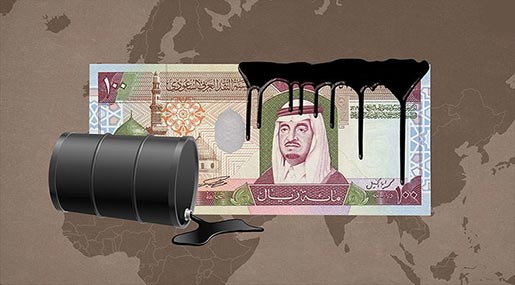Saudi Arabia’s Economic Woes

Darko Lazar
One of the richest countries in the world is facing the most serious economic challenges in its history.

Fresh austerity measures imposed by Saudi Arabia's King Salman further highlight the dire straits of the country's economy. On October 1st, Riyadh slashed ministerial salaries by as much as 20% while government employee bonuses used for apartment and vehicle purchases were cut by 15%. In response to low oil prices, civil servants - who make up two thirds of the kingdom's work force - had their bonuses slashed across the board. But the dominant state sector is still swallowing up 45% of the country's total budgetary resources, resulting in a $128 billion budget deficit in 2015 - the highest among the world's 20 biggest economies.
Meanwhile, Riyadh's attempted ‘reforms', including its ‘more investment, less oil' strategy, have failed to camouflage the fact that the country's economic prosperity will depend almost entirely on oil sales for the foreseeable future.
Perhaps Riyadh's greatest source of concern stems from the uncertainty surrounding the affects of its reform measures - lower salaries, fewer subsidies, the introduction of taxes - on the informal social agreement between the ruling Saudi elite and the radical/Wahhabi movements. Saudi Arabia's ‘conservative' elements do not look too kindly upon the monarchy's hedonistic lifestyle and enormous wealth, raising serious question marks about Riyadh's ability to preserve the status quo and the delicate social balance.
No More Flirting With Oil Prices
In yet another demonstration that things are not going to plan, Riyadh was forced to accept an agreement on capping oil production. During a meeting in Algiers on September 28, the Organization of the Petroleum Exporting Countries [OPEC] agreed to reduce output to a range of 32.50 million barrels per day to 33.0 million bpd, its first output cut since the 2008 financial crisis.
The Saudis had previously resisted the move but it took the kingdom's new oil minister, Khalid Al-Falih, just six months to blink, ending the country's two-year policy of 'pump-at-will'.
Al-Falih's decision acknowledges the cruel reality of Riyadh's manipulation of global oil prices, which has left his country's finances in tatters.
But even more importantly Saudi Arabia's cash flow problems have seriously undermined the kingdom's ability to exert its authority in its traditional spheres of influence. By accepting to cap oil production, Riyadh is effectively giving up its role as the uncontested leader of OPEC.
For market analyst, Gerasimos Papagiannis, developments in recent weeks prove that Saudi Arabia is no longer able to dictate the oil price and impose it on other producers.
"Saudi Arabia's abandonment of such a strategy will have an impact on [oil] prices, allowing them to climb above 50 dollars per barrel," Papagiannis said.
A New Vision?
Today's Saudi Arabia is being confronted with a new reality, one where wages are low and the overall standard of living is on a downward spiral - something the average Saudi is ill prepared for. The growing economic ambiguity as well as the accelerated regional instability is forcing the kingdom to alter its system of governance.
But the last few years have demonstrated a level of incompetence amongst government officials in Riyadh that has no precedent in modern history, exposing the monarchy's inability to deal with existential challenges.
The level of incompetence is embodied by the latest initiative from deputy crown prince Mohammed bin Salman. The so-called Vision 2030, outlining a plan for reducing the country's dependence on oil, is a combination of sweeping aspirations and a complete lack of discussion on how these aspirations are to be met.
The document, unveiled earlier this year, is entirely based on a study by the international management-consulting firm, McKinsey & Company, which looks at Saudi Arabia from an economic angle, completely ignoring the cultural and religious constraints.
The highlights include: the elimination of fuel, power and water subsidies, the establishment of a thriving manufacturing industry, including a defense industry that can be responsible for over 50% of the kingdom's military requirements, and reducing unemployment to 7% by 2030.
Experts described the reform plan as "completely unrealistic", pointing to the fact that Saudi Arabia has been exceptionally uncompetitive in any non-oil related industry.
Meanwhile, attracting foreign investment, even in the form of tourism, may prove to be an extremely difficult task for Riyadh, whose international image is as battered as its finances. Today, the sheer mention of Saudi Arabia is immediately associated with terrorist groups, thanks in no small part to its main international ‘ally'. Washington's recent adoption of the Justice Against Sponsors of Terrorism Act [JASTA], allows families of the victims of the 9/11 terrorist attacks to sue Riyadh.
Saudi Arabia May Disappear as a State
Economic experts almost unanimously agree that Saudi Arabia would not be able to compete in any non-oil related industry on the world stage. Most of them point to the kingdom's economic model, which is based on a leased foreign workforce, while the local population lacks "the culture of work".
President and founder of the Eurasia Group, Ian Bremmer, says that most of the 30 million Saudis are "doing nothing".
"Their young people live with their parents and literally sit at home on the couch, doing nothing over many decades. In Saudi Arabia, many do work, but it is not the native population. These are wageworkers that come from other countries - Bangladesh, Lebanon, the Philippines, and Britain. This is a serious problem. While the government still has money, it can continue to lease foreign workers. But the country simply does not have the culture of work," Bremmer said.
Bremmer is one of many with gloomy predictions when it comes to the future of Saudi Arabia. The kingdom's inability to address mounting challenges in the short term has led many to conclude that Saudi Arabia may cease to exist as a state in the long term.
Source: Al-Ahed News




